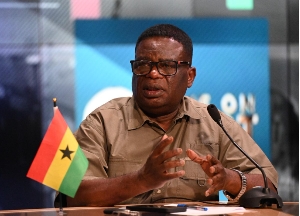The global maritime trade is expected to see a steady growth of 2%–2.4% on the 2023 figures by the end of 2024. In the medium term, however, a 4% increase is expected to be seen by the end of 2028.
Citing these predictions from UNCTAD, Drewry, Clarksons, Clyde and Co, Maritime Law Consultant and Legal Practitioner Dr. Emmanuel Kofi Mbiah has attributed the expected growth largely to demand and supply dynamics around the world favoring increased trade, in the aftermath of the COVID-19 pandemic.
However, like the aforementioned research institutions, Dr. Mbiah is cautiously optimistic, as he advises that an open eye be kept on the ever-dynamic global maritime industry.
Dr. Mbiah, a former chairman of the Legal Committee of the International Maritime Organization (IMO) between 2011 to 2016 was speaking to Kennedy Mornah on the award-winning Eye on Port program on Accra-Based Metro TV during Ghana Month.
He intimated that beyond events of its own making, the far-reaching maritime industry remains vulnerable to external factors.
One practical example is the ongoing geopolitical tensions in Eastern Europe and the Middle East, whose resolution still hangs in the air.
These wars, he revealed, have already had an impact on the maritime trade, including attacks on a few ships, and have consequently disrupted the entire course of shipping along key maritime routes.
Not only have insurance premiums taken a hike, but the duration of voyages has elongated, leading to delays in supplies and increased freight rates.
“You have to look at the geopolitical dimensions. For example, what is happening between Russia and Ukraine and the Israel-Hamas war extending into the Red Sea where Houthi Rebels have attacked ships. What is happening now affects global trade so even though the United States of America and Europe have put in place a mechanism to ensure that vessels are shepherded along key routes, big companies like CMA- CGM, and Maersk line have decided that they will go around the Cape of Good Hope. It is very clear the distance that you have to cover if you do not have to use the Suez Canal and the Red Sea. If you don't use that route, then you are going to add about 3,500 nautical miles which will be a steaming time of around 10 to 12 additional days so you'll be making about 36 to 38 days for a journey that you would have used about 24 to 26 days. Fuel alone cost about 1.6 million pounds. It is quite clear that going around the Cape of Good indeed has a bearing on the outlook of shipping going forward, remember that when that happens immediately it has consequences for insurance. Also important to bear in mind freight rates are likely to go up,” Dr. Mbiah explained.
He said, that while a direct effect of these events on the cost of shipping in Ghana is difficult to establish, the indirect effect is noticeable, and carry-over cost would ultimately be borne by the ordinary consumer.
The former Chief Executive of the Ghana Shippers Authority said it is prudent for local actors in Ghana’s maritime industry to take cognizance of these developments as they plan for the year.
He revealed that in 2022, the world maritime trade saw its biggest year thus far, so far as productivity is concerned, as a remarkable 11.2 billion metric tons of cargo were traded across the globe. This shoot was a clear indicator of a rise in demand following the disruptive pandemic, whose impact on the supply chain was felt most between 2020 and 2021.
Barring any such events, and the hopeful de-escalation of geopolitical tensions, the veteran maritime expert, expects shipping to grow steadily in the next few years.
He revealed that the pandemic also affected delivery targets on new ship orders, which were intended to expand the capacity of the global fleet to reduce costs.
Dr. Mbiah stressed the significance of considering the supply and demand dynamics within the shipping industry when forming an outlook. He emphasized that the prevailing capacity would influence charter rates. These factors, he highlighted, should be taken into consideration to ensure a forecast that aligns with reality.
The Seasoned Maritime Law Consultant, who is also a Senior Lecturer at the University of Ghana, did not hold back when demanding a “just transition” when it comes to Africa’s role in the decarbonization of shipping. He called for Africa’s interests to be well-represented in the laudable cause of transforming shipping into a more environmentally sustainable venture.
“I like to put the just transition just because you know we from the developing economies are at the receiving end of these measures and consequently there is a cost to it; that cost is likely to come back to us,” he said.
Dr. Emmanuel Kofi Mbiah called for regional value chains in Africa to be strengthened to promote the continent’s resilience and resistance to external global shocks.
Business News of Friday, 29 March 2024
Source: Eye on Port

















